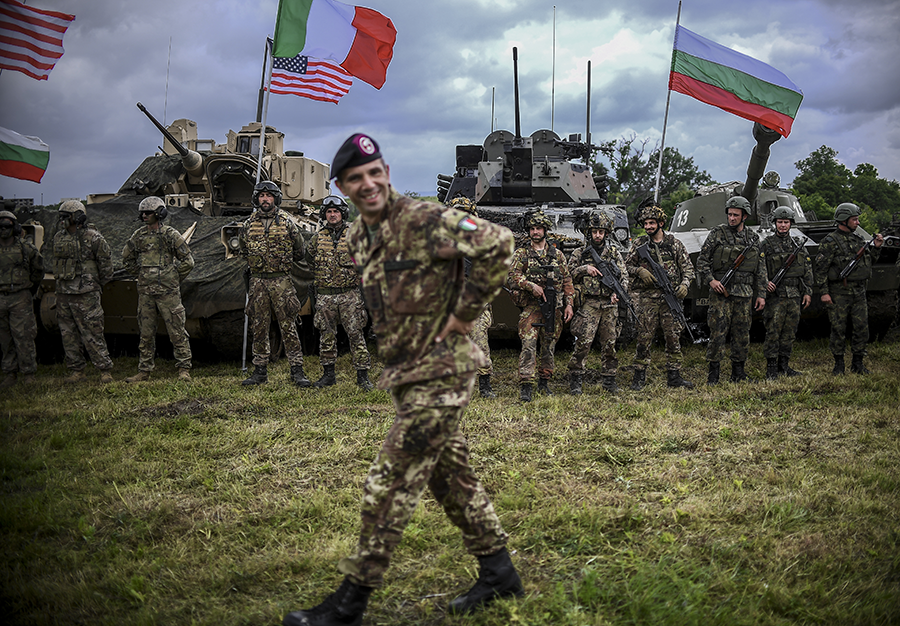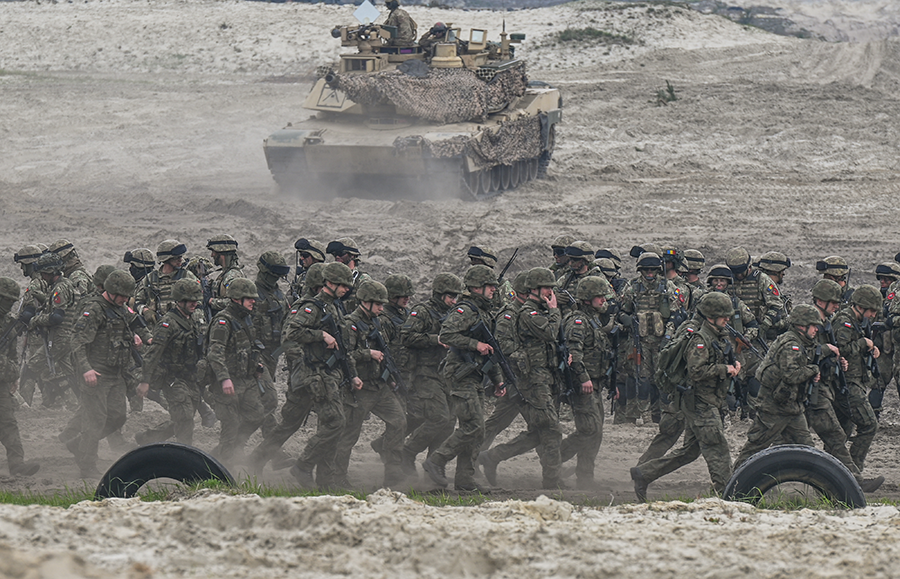"I find hope in the work of long-established groups such as the Arms Control Association...[and] I find hope in younger anti-nuclear activists and the movement around the world to formally ban the bomb."
NATO Allies Suspend Participation in CFE Treaty
December 2023
By Mohammedreza Giveh and Daryl G. Kimball
The United States and its NATO allies will suspend participation in the landmark Conventional Armed Forces in Europe (CFE) Treaty, following Russia’s decision earlier this year to withdraw from the pact.
 The North Atlantic Council, the alliance’s principal political decision-making body, announced the decision Nov. 7, stating that the allies “will suspend the operation of their obligations to the treaty” effective Dec. 7.
The North Atlantic Council, the alliance’s principal political decision-making body, announced the decision Nov. 7, stating that the allies “will suspend the operation of their obligations to the treaty” effective Dec. 7.
“We concluded that we should not continue to be bound by a treaty to which Russia is not bound,” the U.S. State Department said in a statement. “Suspension of CFE [Treaty] obligations will strengthen the [a]lliance’s deterrence and defense capacity by removing restrictions that impact planning, deployments, and exercises.”
In its announcement, the council said that, with this “decision fully supported by all NATO allies,” the alliance intends “to suspend the operation of the CFE Treaty for as long as necessary” as a consequence of Russia’s withdrawal.
The decision was described by U.S. officials as a “suspension of all legal obligations” under the treaty that allows individual states to comply with certain provisions, such as data exchanges, on a voluntary basis.
At some point, states that have suspended participation might resume full, legally binding participation. Since Nov. 7, several NATO states have issued national statements outlining the provisions that they will voluntarily continue to meet.
The treaty, often described as the cornerstone of European security, was signed in 1990 and put equal limits on the quantity of conventional weaponry deployed by NATO and the Warsaw Pact countries. It eliminated the Soviet Union’s quantitative advantage in conventional weapons in Europe and more than 72,000 pieces of NATO and Soviet military equipment.
 Russia’s full-scale invasion of Ukraine in 2022, its withdrawal from the CFE Treaty, and now the decision by NATO states to suspend participation in the accord puts the conventional arms control system in Europe, which was painstakingly built over decades, into near total collapse.
Russia’s full-scale invasion of Ukraine in 2022, its withdrawal from the CFE Treaty, and now the decision by NATO states to suspend participation in the accord puts the conventional arms control system in Europe, which was painstakingly built over decades, into near total collapse.
The United States withdrew from the 1990 Open Skies Treaty in 2020 over a compliance dispute, and Russia followed suit in 2021. (See ACT, July/August 2021.) This leaves the Vienna Document, a confidence-building mechanism by which participating states of the Organization for Security and Co-operation in Europe agree to inspections and data exchanges to increase the transparency of their conventional forces, as the only remaining piece of the post-Cold War conventional arms control security architecture. U.S. officials, speaking on the condition of anonymity, told Arms Control Today that the United States intends fully to participate in and comply with the terms of the Vienna Document.
The dispute between Russia and NATO over the CFE Treaty dates back nearly a quarter century. After the breakup of the Warsaw Pact and the expansion of NATO in the 1990s, efforts were made to revise the agreement to replace the bloc-to-bloc and zonal limits with a system of national and territorial ceilings reflecting the new geopolitical reality.
During the 1999 treaty summit in Istanbul, treaty members signed an agreement known as the Adapted Conventional Armed Forces in Europe Treaty to update the CFE Treaty structure. Russia also pledged to withdraw its forces from Moldova and Georgia and to show restraint in its deployment near the Baltics. (See ACT, November 1999.)
But the United States and its allies did not ratify the adapted treaty, citing the ongoing deployment of Russian forces in Moldova and Georgia. Russia disagreed and complained that Estonia, Latvia, Lithuania, and Slovenia were not subject to CFE Treaty limits. Moscow also wanted constraints eliminated on how many forces it could deploy on its southern and northern flanks. (See ACT, January/February 2008.)
In 2007, Moscow declared its “suspension” of the original treaty in reaction to the ongoing delay of the adapted treaty’s entry into force, thereby halting Russian implementation of treaty-related transparency commitments and conventional force ceilings.
In May 2023, Russia announced that it would withdraw formally from the pact in objection to NATO countries “fueling the Ukraine conflict” and embracing Finland and Sweden as new alliance members. (See ACT, June 2023.) The withdrawal will not have any impact on Russia’s military posture.
At a briefing on Nov. 8 for nongovernmental experts, U.S. officials reaffirmed public statements that the United States and its NATO allies remain committed to effective conventional arms control as a critical element of Euro-Atlantic security.
The officials also said that the allies will continue to pursue measures with responsible partners that aim to bolster stability and security in Europe by reducing risk, preventing misperceptions, avoiding conflicts, and building trust. They did not elaborate on specific measures that would be pursued.
